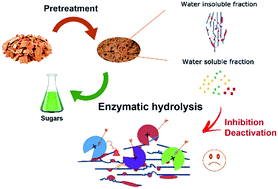Understanding the slowdown of whole slurry hydrolysis of steam pretreated lignocellulosic woody biomass catalyzed by an up-to-date enzyme cocktail
Abstract
Although steam pretreatment could efficiently pretreat various lignocellulosic biomass, it generates water-soluble inhibitory components which significantly slow down cellulose hydrolysis. Most of the previous studies have only evaluated the effect of the inhibitors on the traditional cellulase cocktails while the detailed mechanisms of the pretreatment derived inhibitors on the recently developed enzyme cocktails remain unclear. In addition, the previous studies either focused on the inhibition of cellulose hydrolysis or the inhibition of the activities of cellulases, while it is not elucidated how the cellulose hydrolysis performance is associated with the inhibition of major enzyme activities in the presence of pretreatment derived inhibitors. This study looked at how the water-soluble compounds derived from two typical steam pretreated woody biomasses (lodgepole pine and poplar) might affect the cellulose hydrolysis of pretreated biomass by using the state-of-the-art enzyme preparation (CTec3) and also evaluated their influence on the major enzyme activities. The result showed that both enzyme inhibition and deactivation contribute to the overall decrease in the cellulose hydrolysis. Among the water-soluble compounds, the activities of cellobiohydrolases (CBHs) and β-glucosidases (BGs) were strongly inhibited by sugars in the water-soluble fraction while CBH and xylanase activities were deactivated by phenolics, resulting in the overall decrease in cellulose hydrolysis. Although the major enzymes were inhibited/deactivated significantly, it appeared that the initial cellulose hydrolysis rate was only slightly affected. Instead, the extent of cellulose hydrolysis correlated closely with the inhibition/deactivation of the major enzyme activities.



 Please wait while we load your content...
Please wait while we load your content...